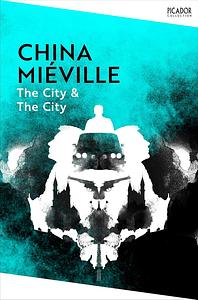Take a photo of a barcode or cover
reflective
slow-paced
Plot or Character Driven:
Plot
Strong character development:
No
Loveable characters:
No
Diverse cast of characters:
No
Flaws of characters a main focus:
No
Loved it. Looking forward to casually citing it as gospel truth the next time someone says the classic "Did you know it's really TWO cities, Buda and Pest?": "Yes, literally everyone knows that, and how some of the streets are crosshatched by both and if you're one city and see people from the other city the mystical police will disappear you, blah blah, knowitall."
This really did a great job of balancing explanations of what was actually going on, and leaving some details and whys/hows mysterious. I'd be very interested to read a followup (although the author seemed very clear in the Q&A at the end that there wouldn't be one), perhaps with more of the backstory and fantastical elements brought out into the open. Really left me wanting more!
This really did a great job of balancing explanations of what was actually going on, and leaving some details and whys/hows mysterious. I'd be very interested to read a followup (although the author seemed very clear in the Q&A at the end that there wouldn't be one), perhaps with more of the backstory and fantastical elements brought out into the open. Really left me wanting more!
mysterious
reflective
tense
slow-paced
Plot or Character Driven:
Plot
Strong character development:
Complicated
Loveable characters:
No
Diverse cast of characters:
Complicated
Flaws of characters a main focus:
Yes
While the mystery was interesting, a lot of the setting of The City & The City went against the grain for me. The idea of "unseeing" and "Breach" were really frustrating concepts to me, and felt laughably unrealistic. I liked Tyador, and the rest of the cast, was curious about the government conspiracies, and even liked most of the reveals. But the setting stretched my suspension of disbelief too far.
I think it's well written, and if you think you can overlook a setting where two cities practically overlap each other, and aren't supposed to acknowledge each other, it's a compelling mystery.
I think it's well written, and if you think you can overlook a setting where two cities practically overlap each other, and aren't supposed to acknowledge each other, it's a compelling mystery.
first half of this was pretty slow, more of an exercise in worldbuilding -- not a negative by any means, I really enjoy reading books with such intricately crafted environments and don't mind slower-paced stories when it's in service of exploring an interesting concept, and mieville really knew what he was doing.
second half was full throttle crime novel and I enjoyed that part too. and the whole time there's bureaucratic absurdities to contend with. even the supernatural forces are bureaucrats and you do have to laugh at the wry irony of it all. because of course nobody's really following any of the rules, especially the people enforcing them.
I thought the payoff was satisfying too, and meaningful in terms of the true nature of The Culprit. this book is good at getting its messages (about borders, about capitalism, about the academia, about repression, about the reasons for conspiracizing, about nationalism)
across without being preachy. the ending is bleak but realistic.
overall a slay
second half was full throttle crime novel and I enjoyed that part too. and the whole time there's bureaucratic absurdities to contend with. even the supernatural forces are bureaucrats and you do have to laugh at the wry irony of it all. because of course nobody's really following any of the rules, especially the people enforcing them.
I thought the payoff was satisfying too, and meaningful in terms of the true nature of The Culprit. this book is good at getting its messages (about borders, about capitalism, about the academia, about repression, about the reasons for conspiracizing, about nationalism)
across without being preachy. the ending is bleak but realistic.
overall a slay
dark
mysterious
sad
tense
medium-paced
Plot or Character Driven:
Character
Strong character development:
No
Loveable characters:
No
Diverse cast of characters:
Yes
Flaws of characters a main focus:
Complicated
Awful book. Well written but completely disgusting.
adventurous
tense
medium-paced
Excellent premise and atmosphere, though the plot flagged a bit in the second half. Miéville’s use of a more “reserved” style of writing here than in his other works (to quote the author himself) worked especially well.
The City & The City - 3.5/5
Cities creep intae our minds in ways we don't expect; concrete reflects back meaning unique to each individual. Our psyches infect cities, making them into their own little world, leaving the physical reality whilst forging a mental one; the City and the City.
But, sometimes, those two worlds don't stay separate, they Breach into each other and we show our city to the world, what we think of each building and street, divorced from their physical reality. But do we really want to see one another's ideas of the world? Or would it be easier to lock them away inside, hide them and show only the physical city, so as not disturb those other realities hiding all around us?
And that is the real strength of this beuk, its ability to create a city of the mind for its main character, Tyador Borlú. We watch him in Beszel, in 'his' city, as it falls apart whilst in that very same street, but an entire country away, invisible Ul Qoman towers reach for the sky. All the while he works his job as a detective for the Beszel Extreme Crime Squad, following the trail of a murder only to.
However, where the story really falls down for me is in the characters themselves. Borlu and his colleagues never really felt more than their stock character traits, Borlu himself as the hardboiled film noir detective, Corwi the young ambitious partner and Dhatt the any means but with a good heart partner. They never really developed past that point and it feels like a missed opportunity, leaving them as little more than half-formed clichés.
The story itself is fun, a murder mystery with plenty of twists and turns to keep the pace up, tying the city and the city together in a maze of plotting.
The writing itself is exceptional, it flows and forms the themes and world in such a way to capture both the noir atmosphere and the psychogeography of the cities. When Borlu looks out over a park or down a street you can feel the two worlds jostling for space whilst simultaneously, and desperately, trying to ignore one another.
Overall, read for the cities, not for their inhabitants.
Cities creep intae our minds in ways we don't expect; concrete reflects back meaning unique to each individual. Our psyches infect cities, making them into their own little world, leaving the physical reality whilst forging a mental one; the City and the City.
But, sometimes, those two worlds don't stay separate, they Breach into each other and we show our city to the world, what we think of each building and street, divorced from their physical reality. But do we really want to see one another's ideas of the world? Or would it be easier to lock them away inside, hide them and show only the physical city, so as not disturb those other realities hiding all around us?
And that is the real strength of this beuk, its ability to create a city of the mind for its main character, Tyador Borlú. We watch him in Beszel, in 'his' city, as it falls apart whilst in that very same street, but an entire country away, invisible Ul Qoman towers reach for the sky. All the while he works his job as a detective for the Beszel Extreme Crime Squad, following the trail of a murder only to
Spoiler
find evidence of a centre of control, a city within the cities, OrcinySpoiler
In the end, the controlling force of Orciny is revealed to be a lie, a lie exploited by companies and governments to exploit the gullible and the paranoid for their own profit; the Deep State a creation of The State.However, where the story really falls down for me is in the characters themselves. Borlu and his colleagues never really felt more than their stock character traits, Borlu himself as the hardboiled film noir detective, Corwi the young ambitious partner and Dhatt the any means but with a good heart partner. They never really developed past that point and it feels like a missed opportunity, leaving them as little more than half-formed clichés.
The story itself is fun, a murder mystery with plenty of twists and turns to keep the pace up, tying the city and the city together in a maze of plotting.
The writing itself is exceptional, it flows and forms the themes and world in such a way to capture both the noir atmosphere and the psychogeography of the cities. When Borlu looks out over a park or down a street you can feel the two worlds jostling for space whilst simultaneously, and desperately, trying to ignore one another.
Overall, read for the cities, not for their inhabitants.
mysterious
reflective
slow-paced
Plot or Character Driven:
Character
Strong character development:
Yes
Loveable characters:
Yes
Flaws of characters a main focus:
Yes



